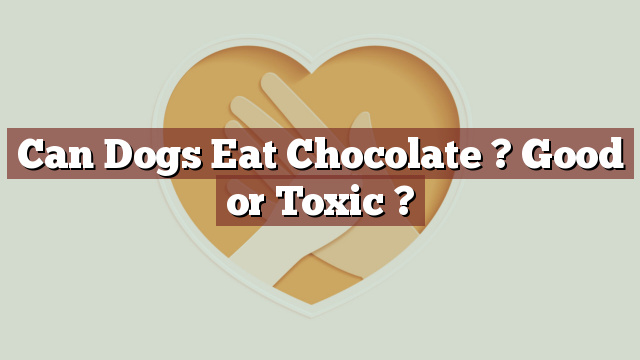Can Dogs Eat Chocolate? Good or Toxic?
Knowing what foods are safe for our furry friends is crucial for their overall well-being. While some human foods can be safely shared with dogs, others can be highly toxic and even fatal. One such food that often raises concerns among dog owners is chocolate. In this article, we will explore the nutritional value of chocolate for dogs, whether it is safe or toxic, potential risks and benefits, what to do if your dog eats chocolate, and ultimately, whether dogs should avoid consuming chocolate.
Nutritional Value of Chocolate for Dogs
Chocolate, particularly dark chocolate, is known for its rich flavor and tempting aroma. It contains various components, including cocoa solids, cocoa butter, sugar, and, in some cases, milk. These components contribute to its unique taste and texture. However, when it comes to dogs, the nutritional value of chocolate is virtually nonexistent. It does not provide any essential nutrients that dogs require for a balanced diet.
Is Chocolate Safe or Toxic for Dogs?
Chocolate is highly toxic to dogs and should never be consumed by them. The reason behind its toxicity lies in a compound called theobromine, which is present in chocolate. While humans can metabolize theobromine efficiently, dogs metabolize it much more slowly, making them highly susceptible to its adverse effects. Theobromine can cause a range of health problems in dogs, including increased heart rate, abnormal heart rhythm, restlessness, tremors, vomiting, diarrhea, seizures, and, in severe cases, even death.
Potential Risks and Benefits of Dogs Eating Chocolate
There are no potential health benefits for dogs when it comes to eating chocolate. However, the risks associated with chocolate consumption are significant. The amount of theobromine present in different types of chocolate varies, with dark chocolate having the highest concentration. Even a small amount of chocolate can be potentially harmful to dogs, depending on their size and the type of chocolate consumed.
What to Do if Your Dog Eats Chocolate
If you suspect that your dog has consumed chocolate, it is crucial to act promptly. The first step is to determine the type and amount of chocolate ingested, as well as the dog’s weight. This information will be vital for your veterinarian to assess the potential risks and guide the appropriate course of action. In some cases, inducing vomiting may be recommended, but this should only be done under veterinary supervision. It is always best to consult a veterinarian immediately to ensure the well-being of your furry friend.
Conclusion: Dogs Should Avoid Consumption of Chocolate
In conclusion, dogs should absolutely avoid consuming chocolate. While it may be a delightful treat for humans, it poses serious health risks to our canine companions. Theobromine, present in chocolate, can be toxic to dogs and can lead to various health issues, some of which can be life-threatening. To keep your dog safe and healthy, it is essential to be aware of the potential dangers of certain foods, including chocolate, and ensure they are kept out of reach. Always consult a veterinarian if you suspect your dog has consumed chocolate or any other toxic substance.
Thank you for investing your time in exploring [page_title] on Can-Eat.org. Our goal is to provide readers like you with thorough and reliable information about various dietary topics. Each article, including [page_title], stems from diligent research and a passion for understanding the nuances of our food choices. We believe that knowledge is a vital step towards making informed and healthy decisions. However, while "[page_title]" sheds light on its specific topic, it's crucial to remember that everyone's body reacts differently to foods and dietary changes. What might be beneficial for one person could have different effects on another. Before you consider integrating suggestions or insights from "[page_title]" into your diet, it's always wise to consult with a nutritionist or healthcare professional. Their specialized knowledge ensures that you're making choices best suited to your individual health needs. As you navigate [page_title], be mindful of potential allergies, intolerances, or unique dietary requirements you may have. No singular article can capture the vast diversity of human health, and individualized guidance is invaluable. The content provided in [page_title] serves as a general guide. It is not, by any means, a substitute for personalized medical or nutritional advice. Your health should always be the top priority, and professional guidance is the best path forward. In your journey towards a balanced and nutritious lifestyle, we hope that [page_title] serves as a helpful stepping stone. Remember, informed decisions lead to healthier outcomes. Thank you for trusting Can-Eat.org. Continue exploring, learning, and prioritizing your health. Cheers to a well-informed and healthier future!

